
Applied Food Research
Scope & Guideline
Advancing Food Science for a Sustainable Future
Introduction
Aims and Scopes
- Food Development and Innovation:
The journal explores novel formulations, processing techniques, and ingredient innovations aimed at enhancing the nutritional quality, sensory attributes, and shelf life of food products. - Food Safety and Quality Assessment:
Research articles often focus on the detection and management of foodborne pathogens, quality control measures, and the impact of various processing methods on food safety. - Nutritional Science and Health Benefits:
The journal emphasizes studies that investigate the nutritional properties of food ingredients and their potential health benefits, including bioactive compounds and functional foods. - Sustainable Food Practices:
There is a consistent focus on sustainable practices in food production, including the valorization of food by-products, eco-friendly packaging solutions, and reducing food waste. - Technological Advancements in Food Processing:
Applied Food Research frequently publishes studies on emerging technologies, such as ultrasound-assisted extraction, non-thermal processing, and innovative food preservation techniques. - Consumer Perception and Market Trends:
The journal addresses consumer attitudes towards food products, including the acceptance of novel foods and the influence of marketing on consumer choices.
Trending and Emerging
- Plant-Based and Alternative Proteins:
Research on plant-based food products and alternative protein sources is on the rise, driven by increasing consumer demand for sustainable and health-conscious food options. - Functional Foods and Nutraceuticals:
There is a growing focus on foods that offer health benefits beyond basic nutrition, including studies on fortification, bioactive compounds, and their physiological effects. - Innovations in Food Preservation:
Emerging technologies for food preservation, such as active packaging, natural preservatives, and non-thermal methods, are gaining attention for their potential to enhance food safety and shelf life. - Food Waste Reduction and Valorization:
Research aimed at reducing food waste through innovative processing techniques and the utilization of food by-products is increasingly prominent, reflecting global sustainability goals. - Digital and Smart Food Technologies:
The integration of digital technologies and smart systems in food processing and supply chain management is becoming a key area of interest, highlighting advancements in food traceability and consumer engagement.
Declining or Waning
- Traditional Food Processing Techniques:
There has been a noticeable reduction in studies focused on conventional food processing methods, as the journal shifts towards innovative and technologically advanced approaches. - Single-ingredient Studies:
Research focusing solely on the properties of single food ingredients is declining, with a growing preference for studies that explore complex formulations and their interactions. - Generalized Nutritional Studies:
There is a waning interest in broad nutritional studies without specific applications or innovations, as the journal emphasizes more targeted research with practical implications. - Regional or Local Food Studies:
While regional studies were once common, there is a decreasing trend in articles centered on specific local foods, as the journal increasingly prioritizes global applications and innovations.
Similar Journals

International Food Research Journal
Unveiling Breakthroughs in Food Science and TechnologyThe International Food Research Journal, published by UNIV PUTRA MALAYSIA PRESS, serves as a pivotal platform for disseminating innovative research within the field of food science. With an ISSN of 1985-4668 and an E-ISSN of 2231-7546, the journal has successfully established its presence since its inception in 2007, converging its findings through 2024. This esteemed journal holds a Q3 ranking in Food Science, illustrating its valuable contributions to the field as demonstrated by its Scopus rank of 276 out of 389, placing it in the 29th percentile among its peers in Agricultural and Biological Sciences. Although it operates under a traditional publishing model, its academic integrity and focus on high-quality research ensure that it remains a vital resource for researchers, professionals, and students eager to explore advances in food technology, nutrition, and safety. By encouraging interdisciplinary collaboration and critical dialogue, the International Food Research Journal plays an essential role in shaping the future of food science research.
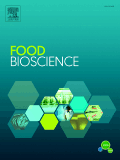
Food Bioscience
Advancing the Frontiers of Food Science and BiosciencesFood Bioscience is a leading peer-reviewed journal published by Elsevier, dedicated to advancing the understanding of the complex interplay between food science and biosciences. With an impressive Impact Factor that places it in the Q1 and Q2 quartiles for Food Science and Biochemistry respectively, the journal consistently ranks among the top publications in its field, reflected in its Scopus rankings (Rank #83/389 in Food Science and Rank #175/438 in Biochemistry). Since its inception in 2013, Food Bioscience has fostered a multidisciplinary approach, bridging gaps between research in agricultural, biological, and food sciences, thus encouraging innovative solutions to the pressing challenges facing the global food supply chain. Although it currently operates under a subscription model, the journal is committed to disseminating high-quality research, making significant contributions to both academic scholarship and industry practices. Researchers, professionals, and students alike are invited to explore the wealth of knowledge contained within its pages as it plays a pivotal role in shaping the future of food bioscience.

CZECH JOURNAL OF FOOD SCIENCES
Exploring Innovative Solutions for Food Safety and TechnologyCzech Journal of Food Sciences is a premier publication in the field of food science, disseminating vital research since its inception in 1999 and transitioning to Open Access in 2007. Published by the Czech Academy Agricultural Sciences, this journal facilitates the exchange of knowledge among researchers, professionals, and students dedicated to advancing the understanding of food systems, safety, and technology. With an ISSN of 1212-1800 and an E-ISSN of 1805-9317, it holds a respectable position with a Q3 ranking in the Food Science category for 2023, illustrating its commitment to high-quality research despite its Scopus rank of 209 out of 389, situated in the 46th percentile. Located in the heart of the Czech Republic, at TESNOV 17, PRAGUE 117 05, this journal serves as an essential resource for those involved in agricultural and biological sciences, paving the way for innovative discoveries and applications in food science.
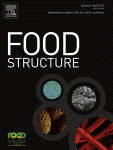
Food Structure-Netherlands
Elevating the Standards of Food Structure StudiesFood Structure-Netherlands, published by Elsevier, stands at the forefront of research in the fields of Applied Microbiology and Biotechnology, Bioengineering, and Food Science. With its ISSN 2213-3291 and a commendable position in the 2023 Q1 category rankings, this journal serves as a vital platform for scholars and professionals seeking to explore the innovative intersections of food structure and its multifaceted applications. The journal has garnered significant recognition, ranking 67th in Food Science and 36th in Applied Microbiology and Biotechnology, placing it in the top echelons of its field with 82nd and 72nd percentiles, respectively. Spanning years from 2014 to 2024, Food Structure-Netherlands aims to disseminate high-quality research that fosters the advancement of knowledge, promoting sustainable practices and technological innovations in the food industry. Researchers, professionals, and students will find this journal to be an invaluable resource for cutting-edge studies and emerging trends in food structure and functionality.
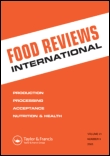
FOOD REVIEWS INTERNATIONAL
Transforming Research into Practical Solutions for the Food IndustryFOOD REVIEWS INTERNATIONAL, published by Taylor & Francis Inc, serves as a pivotal resource within the fields of Food Science and Chemical Engineering. Established in 1985, this esteemed journal offers a comprehensive platform for the dissemination of critical reviews that enhance understanding and innovation in the food industry. With an impressive impact factor reflecting its Q1 quartiles in both Food Science and Chemical Engineering categories, it ranks among the top journals in Scopus, securing the 24th spot in Agricultural and Biological Sciences. Scholars, researchers, and professionals are encouraged to explore its rich content, which spans meticulously reviewed articles that bridge academic research and practical applications, while contributing to advancements in food safety, processing, and sustainability. Although not an Open Access journal, access to its extensive repository is vital for anyone aiming to stay at the forefront of food science advancements.

Food Production Processing and Nutrition
Innovating food processing for a healthier tomorrow.Food Production Processing and Nutrition, published by SpringerNature, stands at the forefront of advancing knowledge in the vibrant fields of food science, nutrition, and public health. This esteemed Open Access journal, operational since 2019, plays a pivotal role in disseminating breakthrough research that intersects food production processes with nutritional insights, making it an invaluable resource for researchers, professionals, and students alike. With a commendable 2023 impact factor reflecting its robust scholarly contributions — Q1 in Food Science and Q2 in both Nutrition and Dietetics and Public Health, Environmental and Occupational Health — the journal not only emphasizes the importance of innovative food processing methods but also addresses pressing nutritional challenges faced globally. Located in the United Kingdom, it claims an impressive Scopus ranking, with a notable percentile standing across various categorical metrics. As such, Food Production Processing and Nutrition is essential for anyone aiming to deepen their understanding of how food systems impact public health through effective processing and nutritional strategies.
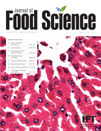
JOURNAL OF FOOD SCIENCE
Elevating Standards in Food Quality and SafetyJOURNAL OF FOOD SCIENCE, published by Wiley, is a premier journal dedicated to advancing the field of food science, bridging the gap between fundamental research and practical application. With an impressive impact factor reflecting its authoritative status, the journal is ranked in the Q1 quartile for Food Science in 2023 and boasts a Scopus ranking of #71 out of 389, placing it in the 81st percentile within Agricultural and Biological Sciences. First launched in 1936, the journal continues to serve as an essential platform for researchers, professionals, and students to disseminate innovative studies and reviews that address critical issues in food quality, safety, and technology. While not currently offering open access, its rigorous peer-review process ensures the dissemination of high-quality and impactful research. Researchers engaged in the vital disciplines of food science will find this journal indispensable for keeping abreast of cutting-edge developments in the field.

FOOD TECHNOLOGY AND BIOTECHNOLOGY
Empowering Researchers to Shape the Future of FoodFOOD TECHNOLOGY AND BIOTECHNOLOGY is a distinguished peer-reviewed journal published by the Faculty of Food Technology and Biotechnology, University of Zagreb, Croatia. Since its inception in 1993, this Open Access journal has become a crucial platform for disseminating innovative research in the fields of food science, biotechnology, and chemical engineering. With a commendable impact factor and consistent Q2 and Q3 rankings across multiple categories—including Biotechnology, Food Science, and Industrial Engineering—this journal not only fosters academic discussions but also addresses real-world challenges in food production, safety, and sustainability. As it converges its thematic scope from 1996 to 2024, FOOD TECHNOLOGY AND BIOTECHNOLOGY remains committed to advancing knowledge through high-quality research and interdisciplinary collaboration, making it an essential resource for researchers, professionals, and students seeking to stay at the forefront of food innovation and biotechnology.

Journal of Food Science and Technology-Ukraine
Empowering Food Scientists with Accessible KnowledgeJournal of Food Science and Technology-Ukraine, published by the Odesa National University of Technology, stands as a pivotal platform dedicated to the dissemination of high-quality research in the field of food science and technology. With its open access policy established in 2014, the journal fosters global knowledge sharing and accessibility, enabling researchers, professionals, and students to access critical findings and advancements in food technology without barriers. The journal's commitment to publishing innovative studies, reviews, and case analyses reinforces its role in addressing contemporary challenges in food safety, preservation, processing, and nutritional quality. With ISSN 2073-8684 and E-ISSN 2409-7004, it serves as a valuable resource for the academic community, supporting the advancement of food science knowledge and its practical applications.
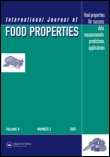
INTERNATIONAL JOURNAL OF FOOD PROPERTIES
Transforming food science through open access research.INTERNATIONAL JOURNAL OF FOOD PROPERTIES, published by TAYLOR & FRANCIS INC, is a leading platform for disseminating high-quality research in the field of food science. With an ISSN of 1094-2912 and E-ISSN of 1532-2386, this journal has been committed to open access since 2018, ensuring that groundbreaking studies are readily available to global audiences. The journal has steadily gained recognition for its contribution to the discipline, achieving a Q2 ranking in Food Science and placing in the 68th percentile among its peers according to Scopus metrics. Covering a wide array of topics related to the properties and applications of food, it serves as a valuable resource for researchers, professionals, and students alike. With coverage extending from 1998 to 2024, the journal continually seeks to advance knowledge and foster innovation within the food science community, making it a pivotal publication for anyone serious about this vital field.